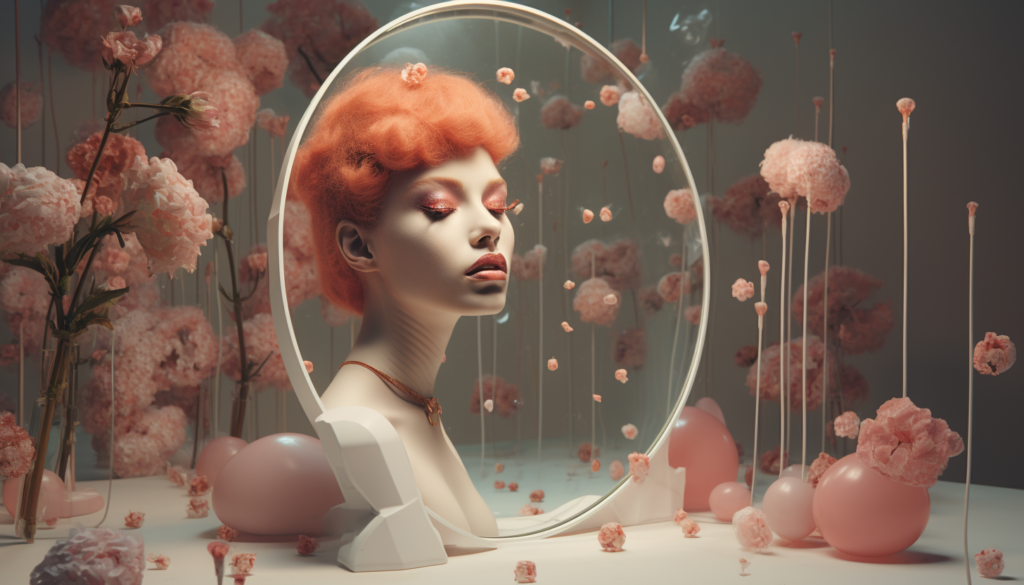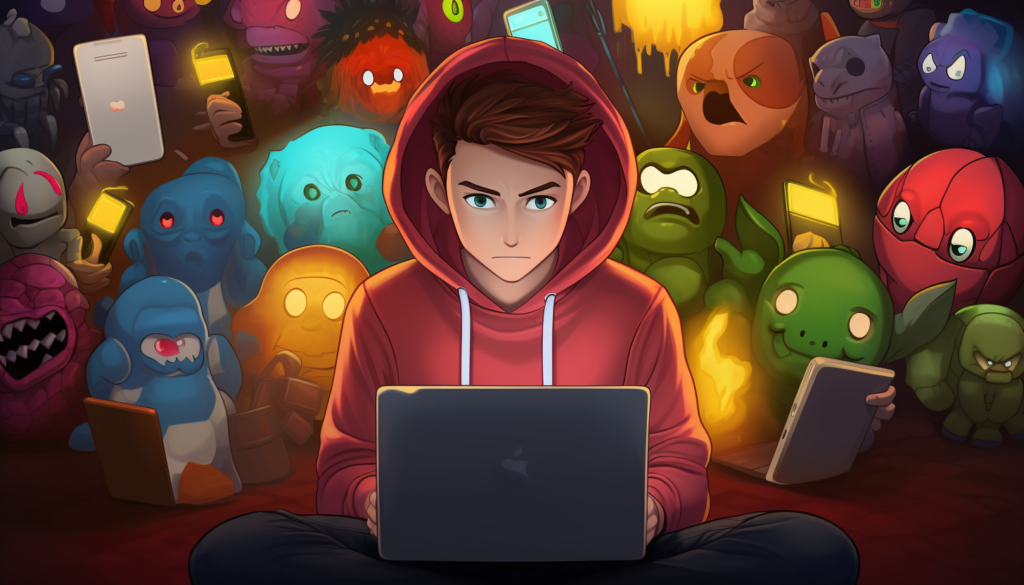Last updated on August 25th, 2025
Imagine a mirror that reflects not just your face but your feelings, thoughts, and even how others see you.
Welcome to the world of social media, where every like, comment, and share becomes a piece of that mirror!
But what happens when the image in this digital mirror starts to shape how we feel about ourselves?
Could that constant buzz of online activity be more than just fun and games?
Join us on a thrilling adventure as we delve into the heart of our online lives!
In this easy-to-follow and exciting blog section, we’re going to explore how those friendly emojis, stunning selfies, and heartwarming comments might be changing the way we see ourselves.
Are you curious to discover the secret connection between your favorite apps and your self-esteem?
Ready to uncover what’s really going on when you scroll through your feed?
Then jump on board, and let’s take this fascinating ride together! You might just see social media—and yourself—in a whole new light!
Understanding the Connection between Social Media and Self-esteem
Do you remember the days before likes, tweets, and followers? They seem like a distant memory, don’t they?
In today’s world, our smartphones buzz with notifications, our screens fill with images, and social media platforms become playgrounds where we express ourselves.
But have you ever stopped to wonder how this digital playground affects how you feel about yourself?
Hold onto your seats, because we’re about to embark on an eye-opening journey to explore the connection between social media and self-esteem!
Whether it’s the thrill of getting a new follower or the sting of a comment that hits too close to home, our online lives are intricately linked to our confidence and self-worth.
Social media platforms like Facebook, Instagram, and Twitter allow us to present curated versions of ourselves to the world.
We showcase our achievements, post captivating photos, and share memorable experiences.
While this can be a positive way to express ourselves, it also opens the door to comparison and self-doubt.
When scrolling through our feeds, we often come across highly edited and polished photos of our friends, celebrities, and influencers.
This constant exposure to seemingly perfect lives can lead to unrealistic expectations and dissatisfaction with our own lives.
We may find ourselves questioning our appearance, accomplishments, and overall worth when comparing ourselves to these curated images.
Furthermore, the use of social media can also fuel the fear of missing out (FOMO).
When we see our friends or acquaintances sharing photos of exciting events or luxurious vacations, we may feel left out or inadequate in comparison.
This FOMO can chip away at our self-esteem, making us feel as though we are not living up to the exciting lives portrayed on social media.
It is important to note that social media is a highlight reel, capturing only the best moments of people’s lives.
Real life is messy, with ups and downs, which are often not showcased online.
Becoming aware of this façade can help manage our expectations and protect our self-esteem.
Comparison Culture on Social Media
The rise of social media has also brought about a new phenomenon known as the “comparison culture.”
With the constant stream of carefully curated posts and images of seemingly perfect lives, it’s easy to fall into the trap of comparing ourselves to others and feeling inadequate.
Comparison plays a significant role in influencing self-esteem. When we constantly compare ourselves to others on social media, we tend to focus on what we lack or what we perceive as our shortcomings.
This can lead to low self-esteem and feelings of inadequacy.
The constant exposure to highlight reels of other people’s lives can create unrealistic expectations and standards that are impossible to meet.
It’s important to remember that what we see on social media is often a highly filtered and edited version of reality.
People tend to present the best parts of their lives, leaving out the struggles, challenges, and insecurities they may be facing.
Comparing ourselves to these idealized versions of others can be damaging to our self-esteem.
One way to counteract the negative effects of comparison culture on social media is to practice self-compassion and focus on our own journey.
Instead of comparing ourselves to others, we should appreciate and celebrate our own accomplishments, strengths, and unique qualities.
Taking breaks from social media and engaging in activities that boost our self-esteem, such as hobbies, exercise, or spending time with loved ones, can also help in cultivating a positive self-image.
Remember that self-esteem is a complex and multifaceted aspect of our well-being.
While social media can certainly have a significant impact on our self-esteem, it’s essential to prioritize our mental health and take steps to protect and nurture our self-worth.
Unrealistic Body Image Standards
The rise of social media has undeniably had a significant impact on society.
One area where this impact is particularly evident is on people’s self-esteem, specifically in relation to body image.
Social media platforms are often flooded with images of perfect bodies, flawless skin, and unrealistic beauty standards.
These images can create a distorted perception of what is considered attractive, leading individuals to compare themselves to these unattainable ideals.
The constant exposure to these images can negatively impact individuals’ self-esteem and body image, as they may feel inadequate or not measure up to these standards.
Research has consistently shown a correlation between social media use and decreased self-esteem.
A study by Fardouly et al. (2015) found that frequent exposure to idealized images on social media led to increased body dissatisfaction among young women.
Another study by Perloff (2014) highlighted how individuals are more likely to engage in negative social comparisons when exposed to images of attractive peers on social media.
Social media not only fosters the comparison but also provides a platform for individuals to seek validation through likes, comments, and followers.
The number of likes or positive comments on a post can become a measure of self-worth, leading individuals to seek external validation for their appearance.
However, this reliance on external validation can be detrimental to one’s self-esteem, as it places the power of self-worth in the hands of others.
Furthermore, the ability to alter and enhance one’s appearance through filters and editing apps has become commonplace on social media.
This trend further promotes unrealistic beauty standards and can lead to individuals feeling dissatisfied with their own natural appearance.
The pressure to present a perfect image online can contribute to feelings of inadequacy and impact self-esteem.
Cyberbullying and Trolling
Cyberbullying and trolling are two prevalent issues that can have a detrimental effect on an individual’s self-esteem.
Cyberbullying: This refers to the use of digital platforms to intimidate, harass, or humiliate someone.
It can take various forms, including spreading rumors, making hurtful comments, or sharing embarrassing photos or videos.
Without face-to-face interaction, cyberbullies feel a sense of anonymity, leading them to engage in behaviors that they may not typically exhibit in-person.
The constant exposure to cyberbullying can erode an individual’s self-esteem, causing feelings of fear, shame, and inadequacy.
Trolling: Trolling is another behavior commonly observed on social media platforms. Trolls deliberately provoke and offend others online, often just for their amusement.
They use ridicule, sarcasm, and offensive language to upset and disturb their targets.
Being on the receiving end of trolling can have a significant impact on one’s self-esteem, as it creates a hostile and belittling online environment.
The negative effects of cyberbullying and trolling on self-esteem are far-reaching. Victims often experience a decline in their self-confidence, self-worth, and overall mental well-being.
Constant exposure to hurtful or offensive messages can lead to feelings of isolation, anxiety, and depression.
To combat these negative effects, it is crucial to develop strategies to protect oneself in the digital world.
This includes being mindful of the content we consume and engage with online, setting boundaries in terms of online interactions, and seeking support from friends, family, or mental health professionals when necessary.
Creating awareness about the impact of cyberbullying and trolling on self-esteem is essential.
By educating individuals about these issues and promoting online safety and kindness, we can work towards creating a healthier and more positive online community.
In conclusion, cyberbullying and trolling have a significant impact on an individual’s self-esteem.
The negative effects can lead to long-lasting emotional damage and mental health issues.
It is vital to address these issues by promoting awareness, educating individuals, and fostering a safe and supportive online environment.
Social Media Validation
The rise of social media has also brought about the phenomenon of seeking validation through likes, comments, and follows.
This constant need for validation can have a significant impact on self-esteem.
Social media platforms have become a virtual popularity contest. The number of likes, comments, and follows that a person receives on their posts has become a measure of their worth and popularity.
This constant monitoring of engagement can lead to feelings of insecurity and low self-esteem.
Likes: When a person receives a high number of likes on their posts, it can boost their self-esteem and make them feel validated. However, the opposite is also true.
When someone’s posts receive fewer likes than they had hoped for, it can lead to feelings of disappointment and inadequacy.
Comments: Comments on social media can also have a significant impact on self-esteem. Positive comments can make a person feel appreciated and admired, while negative comments can be incredibly damaging.
Cyberbullying is a prevalent issue on social media platforms, and negative comments can cause severe emotional distress.
Follows: The number of followers a person has on social media has become a measure of their popularity and influence. When someone gains a significant number of followers, it can boost their self-esteem.
On the other hand, if someone loses followers or fails to gain a substantial following, it can lead to feelings of insecurity and self-doubt.
Remember that social media is a curated version of reality. People tend to post their best moments and highlight reels, which can create an unrealistic standard of comparison.
It’s crucial to maintain a healthy perspective and not let social media validation define our self-worth.
Seeking validation through likes, comments, and follows can have both positive and negative effects on our self-esteem. It’s essential to prioritize our mental health and not rely solely on social media for validation.
Fear of Missing Out (FOMO)
One common phenomenon associated with social media is the Fear of Missing Out (FOMO).
Social media often portrays an idealized version of reality, where people selectively post pictures and updates that showcase their best moments and achievements.
This can lead to a distorted perception of reality, causing individuals to compare themselves to others and feel inadequate.
When scrolling through our social media feeds, we often see friends and acquaintances sharing their travel adventures, professional success, and happy relationships.
These constant reminders of others’ seemingly perfect lives can leave us feeling left out, unsuccessful, and less confident.
Note that social media is not an accurate representation of people’s entire lives.
The curated content we see on platforms like Facebook, Instagram, and Twitter can create an illusion of perfection that doesn’t reflect the full range of emotions and experiences that individuals go through.
Here’s a table to help illustrate the impact of social media on self-esteem:
| Effects of Social Media on Self-esteem |
|---|
| Fear of Missing Out (FOMO) |
| Comparison to Others |
| Negative Body Image |
| Cyberbullying and Trolling |
| Addiction and Overdependence |
It’s crucial to recognize the potential negative impact of social media on our self-esteem and take steps to mitigate its effects.
Limiting our time on social media, being mindful of our reactions when scrolling through our feeds, and focusing on our own growth and achievements can help maintain a healthier perspective.
Remember that everyone has their own struggles and insecurities. No one’s life is perfect, despite what social media may suggest.
Building a Healthy Relationship with Social Media
Building a healthy relationship with social media is crucial for maintaining a positive self-esteem.
Here are some tips to help you maintain self-esteem in the digital age:
- Limit your screen time: Spending excessive amounts of time on social media can contribute to feelings of inadequacy and comparison. Set boundaries for yourself and allocate specific times for social media use.
- Follow positive and uplifting accounts: Surround yourself with content that inspires and motivates you. Unfollow accounts that make you feel negative or insecure about yourself.
- Practice self-care: Take time for self-care activities that boost your self-esteem. Engage in hobbies, exercise, spend time with loved ones, or practice mindfulness and meditation.
- Remember that social media is a highlight reel: It’s essential to remind yourself that social media only shows a curated version of people’s lives. People tend to share their best moments and achievements, creating an unrealistic portrayal of reality.
Tips for Maintaining Self-esteem in the Digital Age
- Focus on yourself: Instead of constantly comparing yourself to others, focus on your own progress and growth. Celebrate your achievements and value your unique qualities.
- Practice self-compassion: Be kind to yourself and practice self-compassion. Treat yourself with the same understanding and empathy you would extend to a loved one.
- Engage in offline activities: Balance your time spent on social media with offline activities. Invest in relationships, pursue hobbies, and engage in activities that bring you joy and fulfillment.
- Seek support: If you find that social media is significantly impacting your self-esteem, seek support from friends, family, or a mental health professional. They can provide guidance and help you develop strategies to navigate the digital world.
Remember, social media can be a valuable tool for connecting and sharing, but it shouldn’t define your self-worth.
Building a healthy relationship with social media and prioritizing your self-esteem is key to thriving in the digital age.
Social Media and Mental Health
Research has shown a correlation between excessive social media usage and negative effects on mental well-being, including self-esteem.
Studies have found that constantly comparing oneself to others, as often happens on social media, can lead to feelings of inadequacy and decreased self-esteem.
Social media platforms often present a facade of perfect lives, where individuals showcase their highlight reels, filtered photos, and accomplishments.
This display of seemingly flawless lives can lead to unrealistic expectations and a distorted perception of reality.
Additionally, receiving a limited number of likes, comments, or followers on social media posts can evoke feelings of inadequacy and low self-worth.
The constant pressure to gain validation through social media metrics can be detrimental to self-esteem.
Furthermore, the phenomenon of cyberbullying on social media platforms can have severe consequences for self-esteem.
Online harassment and negative comments can cause emotional distress and further fuel feelings of insecurity and worthlessness.
It is important to acknowledge that not all aspects of social media are negative. It can serve as a tool for connection, inspiration, and self-expression.
However, it is crucial to be mindful of our social media usage and its potential impact on our mental well-being.
Taking steps to maintain a healthy relationship with social media, such as setting time limits, curating positive content, and engaging in offline activities, can help protect our self-esteem.
Final Thoughts – The Impact of Social Media on Self-Esteem
The impact of social media on self-esteem is a complex and multifaceted issue.
While it is evident that social media can have both positive and negative effects on one’s self-esteem, it ultimately comes down to how individuals choose to use and engage with these platforms.
On one hand, social media can provide a platform for individuals to connect with others, share their experiences, and seek support.
It can serve as a source of inspiration and empowerment, as people have the opportunity to showcase their achievements and talents.
Additionally, social media can be a valuable tool for self-expression, allowing individuals to explore their identities and interests.
However, it is crucial to acknowledge the potential negative impacts that social media can have on self-esteem.
The curated nature of social media platforms can create a distorted perception of reality, leading to feelings of inadequacy and comparison.
The constant exposure to carefully constructed and edited images can contribute to body image issues and a decrease in self-worth.
Furthermore, the pressure to conform to societal beauty standards and to maintain a certain online persona can be overwhelming.
Empowering individuals to use social media positively for self-esteem is essential. This can be achieved by promoting realistic and authentic representations of oneself and others.
Encouraging individuals to cultivate a healthy online presence, focusing on self-acceptance and self-love, rather than seeking validation from others, is crucial.
Implementing practices such as taking breaks from social media, setting boundaries, and fostering real-life connections can also help individuals maintain a balanced perspective.
Ultimately, it is crucial for individuals to remember that their self-worth should not be determined by the number of likes, followers, or comparisons to others on social media.
Engaging in self-care, practicing self-compassion, and cultivating genuine relationships offline are important factors in building and maintaining healthy self-esteem.
By understanding and navigating the impact of social media on self-esteem, individuals can harness the positive aspects of these platforms while protecting their well-being.
It’s important for society as a whole to advocate for responsible social media use and to create a more inclusive and supportive online environment.
Ready to embrace your inner beauty and boost your confidence? Discover the secrets to feeling and looking fabulous with pheelpretty!





